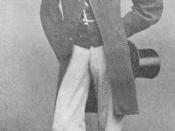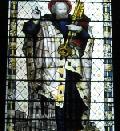While much attention has been brought upon Margery Kempe's behavior in her book The Book of Margery Kempe, an exploration of her movements is also essential in thoroughly understanding her book. One cannot fully understand the importance of her story and the meaning of her other behaviors without understanding her travels. She uses her travels as one medium to impose the importance of self on the social. Margery Kempe uses her travel as a medium of expression, while exploiting it as a mode of social construction. Her travels disrupt the way categories of personhood are created, which ultimately challenges the way society functions as a whole.
In understanding the importance of Kempe's travels, the link must be made between both cultural and social practices and beliefs of the time. The most obvious reason is that independent travel undertaken by women works against the traditional female social functions of the time, such as bearing and raising children.
Since travel would not permit women to stay in this role, it forms a violation of what the larger culture demands as a social duty. Kempe's traveling "stir up all kinds of anxiety and anger in people [indicating] the transgressive dynamic of travel" (Bowers 29). She was unlike other women, "few lay people abandoned spouse, children, work, and ordinary life in search of religious perfection as she did" (Lynch 8). Kempe's traveling stirs up anger in people, representing how she is looked down upon through social standards.
It appears at the beginning of The Book of Margery Kempe that Kempe feels dead, "And after she conceived . . . she despaired for her life, weening she might not live," while her turning to God begins her rebirth. In her time of need she "sent for her ghostly father, for she had a thing...


